Its possible that you must have seen an addressable manual call point at various buildings without even knowing that the piece of small equipment that hangs useless there is called an addressable manual call point.
Mostly, you’ll find these piece of useful equipment in school, office buildings, places of worship and even in hospitals
What exactly are addressable manual call point
In case you may be overwhelmed by curiosity, addressable manual call points are basically another form of what a typical fire detector does. Also, it performs almost the same function with a fire detector.
However, the major difference between a fire detector an addressable manual call point is in the fact that you as a person now serves and work as the fire detector instead of the device.
With an addressable manual call point, you can easily notify people within a bulding that there is an impending fire explosion or a small fire that is gradually getting big. With this, people are required to take a quick step towards being safe.
How does addressable manual call point work?
Addressable manual call point are usually fixed as one of the component of a conventional fire alarm system at strategic places within a building. More so, there are some that are waterproof that can be placed within the external part of a building.
In most cases, the addressable manual call point is usually connected to a part of a fire alarm control panel, so that in case there is fire somewhere, you can easily activate the alarm to send a signal to the control panel to notify it of a fire in the building.
So, you can see this as you are the fire detector that is alerting the fire alarm to send a signal to the main control circuit to turn it on.
Once the control panel receives the signal from the addressable manual call point, he or she will be aware that there is an impending fire somewhere that needs appropriate action to be taken.
However, in some cases, there are some sophisticated control panels that are designed to send automatic message directly to the emergency unit of the building or complex.

Evolution of Addressable Manual Call Point
In the past, addressable manual call points were designed with a glass that needs to be broken before the alarm system can be turned on to notify people of a fire outbreak, and it was usually referred to as “break glass”
However, due to the cost of replacing this glass as well as the danger of getting someone injured in the process of breaking the glass, modern addressable manual call point now has a plastic component for activating the alarm system.
More so, the new type of manual call point now have a rest button, which makes them to be used over and over again. With this, it then becomes very difficult for vandals to put up a false fire alarm within a building.
How to use/operation an addressable manual call point
Once you notice a fire anywhere around a building with an addressable manual call point, kindly follow these steps to activate the alarm system.
You never can tell, your action can mean the difference between a serious fire hazard and a whole building, lives properties that have been saved from destruction.
- Press the call point element marked by the arrows firmly to avtivate the alarm system.
- Run for the safety of your precious life.
- After the fire has been arrested, you can reset the alarm button for future use.
Contact us for high quality addressable manual call point
Being pro-active in protecting your life, that your friends, loved ones and properties is the first step to safety.
So, getting an addressable manual call point installed in your office or home is an important step to take.
For more information, enquiries or to make a purchase, kindly click here to contact us.








